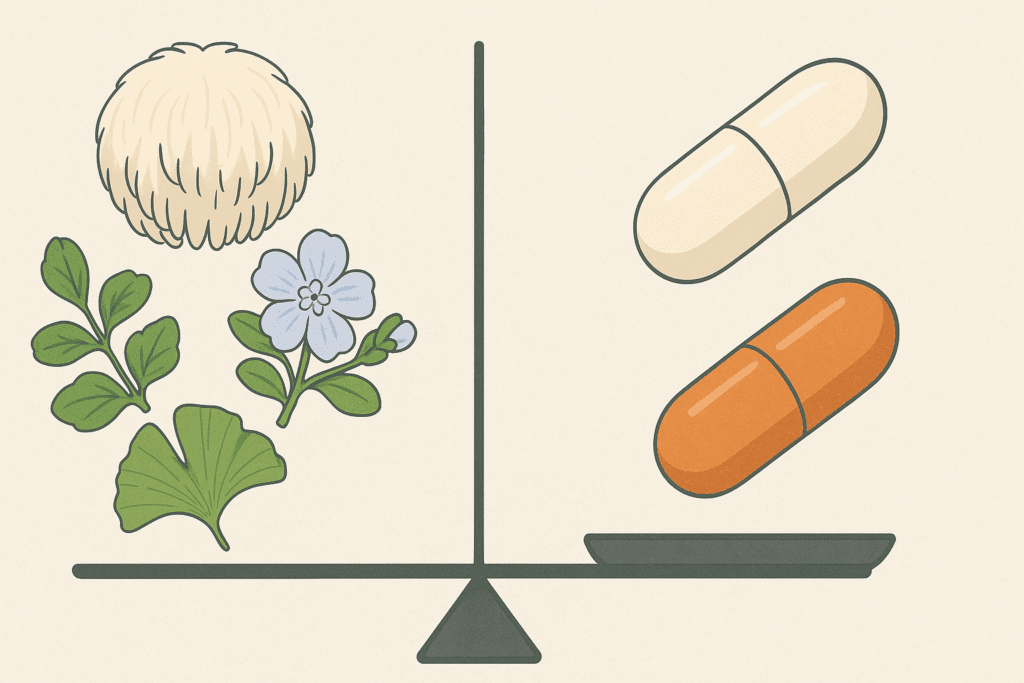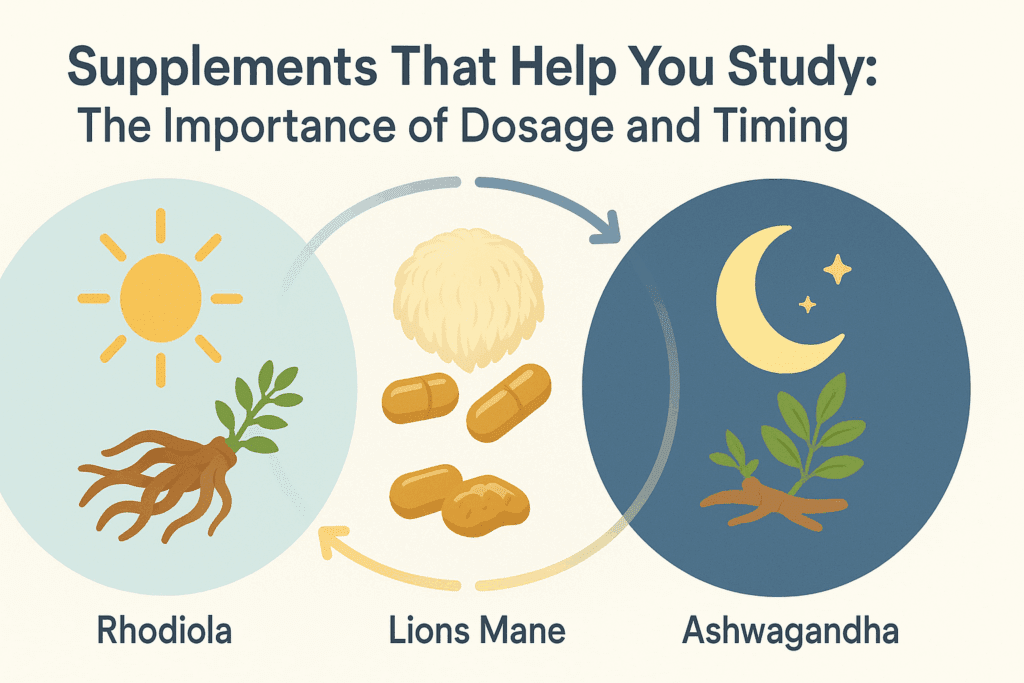In the pursuit of academic excellence, the ability to focus, retain information, and perform under pressure becomes essential. Students, especially at the college and graduate levels, are no strangers to the intense cognitive and emotional demands of modern education. Increasingly, individuals are turning to natural cognitive enhancers to meet these demands, with particular interest in adaptogens and other supplements that help you study. These compounds are revered not only for their potential to support brain function but also for their ability to mitigate the physical and emotional toll of chronic stress, thereby fostering an environment more conducive to focused learning.
You may also like: Unlock Powerful Stress-Relief with Adaptogenic Mushrooms and Stamina Herbal Support

Understanding the Science Behind Cognitive Stress
Academic environments are rife with stressors, from deadlines to high-stakes exams. Chronic stress elevates cortisol levels in the body, disrupting sleep patterns, impairing memory consolidation, and weakening the immune system. The hippocampus, a critical brain region responsible for memory and learning, is particularly susceptible to stress-induced damage. As cortisol levels rise, so does the likelihood of reduced neuroplasticity, which negatively impacts a student’s capacity to retain and process new information.
Adaptogens and brain-supporting supplements aim to buffer this stress response. Unlike synthetic stimulants that often lead to crashes or long-term dependency, many of these natural alternatives support the hypothalamic-pituitary-adrenal (HPA) axis, fostering homeostasis. They do not force the body into overdrive; instead, they gently support the body’s ability to adapt to challenges, which is especially critical for students juggling demanding schedules and complex intellectual tasks.

What Makes Adaptogens Unique?
Adaptogens are a distinct class of herbs and mushrooms recognized for their ability to promote balance in the body’s stress response systems. Their function is not merely to sedate or energize but to modulate the physiological processes involved in stress adaptation. Unlike caffeine or sugar, which provide short bursts of energy, adaptogens work over time to optimize endurance, clarity, and resilience. This long-term modulation can be particularly beneficial for individuals under sustained academic pressure.
Common adaptogens include Rhodiola rosea, Ashwagandha, and Lion’s Mane mushroom. Each of these has a unique biochemical profile, targeting different aspects of cognitive and emotional health. While Rhodiola is known for its capacity to enhance stamina and reduce fatigue, Ashwagandha primarily mitigates anxiety and supports endocrine balance. Lion’s Mane, a medicinal mushroom, fosters the growth of nerve growth factor (NGF), which is critical for neurogenesis and cognitive repair.

Supplements That Help You Study: The Role of Rhodiola Rosea
Rhodiola rosea, a golden-rooted plant native to the Arctic regions of Europe and Asia, is among the most researched adaptogens for cognitive enhancement. Clinical studies suggest that Rhodiola helps regulate cortisol production, which is often elevated in individuals exposed to chronic stress. By modulating cortisol, Rhodiola aids in preserving energy levels, maintaining mental clarity, and improving mood.
Students who use Rhodiola often report greater stamina during late-night study sessions, improved concentration, and a reduction in burnout symptoms. Its active compounds, rosavin and salidroside, are believed to interact with neurotransmitters such as serotonin and dopamine, thereby enhancing mood and mental performance. Unlike conventional stimulants, Rhodiola does not create dependency or disrupt sleep patterns, making it a reliable ally for sustainable academic performance.
Ashwagandha: A Calming Cognitive Ally
Another cornerstone among supplements that help you study under stress is Ashwagandha. Known scientifically as Withania somnifera, this ancient Ayurvedic herb is lauded for its ability to reduce anxiety, regulate cortisol levels, and promote mental clarity. Its adaptogenic properties allow it to balance the body’s fight-or-flight response, facilitating a calmer internal state even amidst external academic chaos.
What makes Ashwagandha particularly appealing for students is its dual action: it not only improves stress resilience but also enhances cognitive functions such as memory, attention, and executive processing. A number of placebo-controlled trials have shown that individuals taking Ashwagandha extract experience lower stress scores and better working memory. Moreover, its calming effect can counteract the jitteriness or restlessness associated with stimulant-based nootropics.
Lion’s Mane: The Brain-Boosting Mushroom
Lion’s Mane mushroom (Hericium erinaceus) is rapidly gaining popularity in the academic and biohacking communities due to its powerful neuroregenerative properties. Unlike other adaptogens that primarily modulate stress, Lion’s Mane actively supports brain plasticity through the stimulation of nerve growth factor (NGF). This makes it particularly effective for students seeking to enhance memory retention and neural efficiency.
Multiple studies have shown that regular consumption of Lion’s Mane can improve cognitive function in both older adults and younger populations. Its unique capacity to foster neuronal growth makes it an excellent choice for long-term academic goals, where sustained mental performance is required. Unlike many synthetic cognitive enhancers, Lion’s Mane offers neuroprotective benefits without side effects or habituation, making it a foundational element in many adaptogenic stacks.

Supplements That Help You Study: Comparing Prevagen, Neuriva, and Their Natural Alternatives
The marketplace is saturated with branded cognitive supplements, but not all are created equal. Products like Prevagen and Neuriva have gained massive popularity, often through aggressive marketing rather than strong clinical backing. Prevagen claims to improve memory through its active ingredient apoaequorin, a jellyfish protein. However, skepticism persists about its efficacy, as many experts argue that the digestive system breaks down apoaequorin before it can reach the brain.
Neuriva, on the other hand, contains coffee fruit extract and phosphatidylserine. While some research supports the neuroprotective qualities of these ingredients, questions such as “does Neuriva work” and “is Neuriva safe” remain common among consumers. There are concerns, particularly among those with preexisting health conditions, prompting queries like “can you take Neuriva if you have high blood pressure?” Clinical evidence is still evolving, and while some users report subjective improvements, others see minimal benefit.
For those exploring more holistic alternatives, adaptogens like Lion’s Mane and Rhodiola offer promising, research-backed results. When assessing focus factor vs Prevagen, or evaluating youthful brain vs Prevagen, one must consider bioavailability, ingredient transparency, and long-term safety. Natural mind boosters, particularly those that have been studied in traditional medicine and modern trials alike, often provide comparable benefits without the risks associated with synthetic compounds or proprietary blends.

Adaptogenic Synergy: Stacking for Maximum Impact
Combining adaptogens and supplements can often yield synergistic effects, leading to enhanced cognitive performance. Known as stacking, this practice involves blending multiple compounds that complement each other to target different aspects of mental performance and stress resilience. For example, a stack combining Rhodiola and Lion’s Mane can simultaneously address stress reduction and neurogenesis, creating a dual-action strategy for intense academic periods.
Other popular combinations include Ashwagandha with Bacopa Monnieri, another Ayurvedic herb known for enhancing memory and learning capacity. These combinations not only help regulate the stress response but also enhance attention span, reduce mental fatigue, and improve overall mood. It is critical, however, to pay attention to dosage, timing, and individual tolerance, as even natural substances can produce side effects if misused.

Supplements That Help You Study: The Importance of Dosage and Timing
One of the most overlooked aspects of supplementation is the importance of proper dosage and timing. Adaptogens are not magic pills; their effectiveness depends on consistent use, often over weeks or even months. Rhodiola, for instance, is most effective when taken in the morning, as it may cause alertness that interferes with sleep. Conversely, Ashwagandha is best taken in the evening due to its calming properties.
Lion’s Mane is typically taken in two daily doses to maintain steady NGF levels throughout the day. Unlike fast-acting pharmaceuticals, these natural supplements build up in the system gradually, producing cumulative effects over time. Students who expect immediate results may be disappointed unless they integrate these tools into a holistic routine that includes proper sleep, hydration, and nutrition.
Does Neuriva Really Work? An Evidence-Based Review
The question “does Neuriva really work” is both common and complex. Neuriva’s active ingredients, phosphatidylserine and coffee fruit extract, have been shown in some studies to support cognitive function. However, the research is not as robust or extensive as that supporting traditional adaptogens. Many users report subjective improvements in memory and focus, but placebo-controlled studies have yielded mixed results.
Safety is another consideration, especially for those managing chronic conditions. While Neuriva is generally well-tolerated, those with cardiovascular issues often ask, “can you take Neuriva if you have high blood pressure?” Although no severe interactions have been widely reported, caution is advised due to the caffeine-related compounds present in the coffee fruit extract. It is always advisable to consult a healthcare provider before starting any new supplement regimen.
The Case for Prevagen Alternatives
Prevagen is often marketed as a memory enhancer for aging populations, but it is increasingly used by students and professionals seeking cognitive enhancement. However, as with Neuriva, concerns about efficacy and safety persist. This has led to a growing interest in Prevagen alternatives, especially those grounded in herbal medicine and supported by clinical data.
Adaptogens such as Bacopa Monnieri, Ginkgo Biloba, and Lion’s Mane offer compelling benefits. When comparing ginkgo biloba vs Neuriva, for example, Ginkgo stands out for its ability to improve blood flow to the brain and support memory formation. Unlike Prevagen, which contains a single controversial ingredient, these natural options offer multifaceted benefits and a lower risk profile. For those asking, “what works better than Prevagen,” the answer often lies in a combination of natural ingredients tailored to individual needs.
Lifestyle Foundations That Support Supplement Efficacy
Supplements, no matter how potent, should never be a replacement for foundational health practices. Sleep, exercise, nutrition, and stress management all play critical roles in cognitive performance. Without these pillars, even the most advanced nootropic stack will yield diminished returns. Adaptogens function best when they are part of a holistic lifestyle approach.
Sleep, in particular, has a bidirectional relationship with cognitive performance. Chronic sleep deprivation undermines the very neurotransmitter pathways that supplements aim to support. Nutrition is equally vital, as many cognitive enhancers require certain cofactors—such as B vitamins or magnesium—to function optimally. When students neglect these basics, they risk undermining the benefits of the very supplements they invest in.

Natural Mind Boosters Beyond Pills
While capsules and powders dominate the supplement space, not all cognitive enhancers come in pill form. Certain functional foods, teas, and even breathing practices can serve as natural mind boosters. Matcha green tea, rich in L-theanine and moderate caffeine, provides calm alertness without the crash associated with coffee. Fermented foods rich in probiotics can enhance the gut-brain axis, which plays a crucial role in emotional regulation and mental clarity.
Mindfulness practices, though not ingestible, are equally powerful. Techniques like focused breathing, progressive muscle relaxation, and guided visualization can significantly reduce cortisol and increase alpha brain wave activity, supporting creativity and focus. These non-pharmacological tools are highly accessible and synergize well with adaptogenic supplementation, creating a comprehensive mental wellness toolkit.
Which Is Better: Prevagen or Neuriva?
Deciding between Prevagen and Neuriva often boils down to individual goals and sensitivities. For those seeking a quick cognitive boost, Neuriva’s coffee fruit extract may offer a mild improvement in alertness. However, for long-term memory support, many find Neuriva’s formulation underwhelming, prompting comparisons like youthful brain vs Prevagen or focus factor vs Prevagen.
Ultimately, neither product outshines evidence-backed natural alternatives in a meaningful way. Consumers increasingly gravitate toward holistic regimens that include adaptogens, functional foods, and lifestyle strategies. These offer the benefits of sustained energy, improved memory, and stress resilience without the concerns of synthetic compounds or over-hyped marketing claims. Whether someone is a college student or an aging professional, the goal remains the same: to support cognitive health in a safe, effective, and sustainable manner.
Frequently Asked Questions: Expert Guidance on Supplements That Help You Study
What makes supplements that help you study more effective when combined with lifestyle changes?
Supplements that help you study are most effective when integrated into a consistent lifestyle that supports brain health. While these supplements can enhance memory, attention, and stress resilience, their benefits are significantly magnified when combined with proper sleep, regular physical activity, and balanced nutrition. For instance, adaptogens like Rhodiola or Ashwagandha help regulate cortisol, but chronic sleep deprivation can negate their effects. Similarly, natural mind boosters like Lion’s Mane require consistent intake and are more impactful when the body is already receiving sufficient hydration and nutrients. The synergistic effects of a well-rounded routine, including mindfulness practices and digital detox intervals, allow supplements to operate in a physiologically optimized environment, resulting in sharper cognitive performance and better academic endurance.
Can you take Neuriva if you have high blood pressure or other cardiovascular conditions?
If you’re wondering, “can you take Neuriva if you have high blood pressure?” the answer is: it depends on the specifics of your condition. Neuriva contains coffee fruit extract, which can contain small amounts of caffeine-like compounds. While these compounds are generally mild, they could affect individuals who are particularly sensitive to stimulants. If you’re managing high blood pressure, it’s crucial to consult a physician before incorporating Neuriva into your routine. Alternative supplements that help you study, such as adaptogenic mushrooms or magnesium-rich cognitive enhancers, may offer similar benefits without elevating cardiovascular risk. Personalized recommendations from a healthcare provider ensure that your cognitive goals do not come at the expense of your cardiovascular stability.
Does Neuriva really work, and what should you consider before trying it?
The question “does Neuriva really work” arises frequently among students and professionals alike. While there is some evidence that phosphatidylserine and coffee fruit extract—Neuriva’s main ingredients—can support brain health, the overall body of research is still evolving. Most studies suggest modest cognitive improvements, particularly in areas like memory recall and focus. However, these benefits are not guaranteed for all users and may depend on age, baseline mental function, and concurrent lifestyle factors. If you’re seeking targeted supplements that help you study for extended periods, it might be worth considering other options with broader clinical support or stacking Neuriva with proven natural mind boosters.
How do Prevagen alternatives compare in terms of safety and effectiveness?
Prevagen alternatives are growing in popularity due to mounting concerns about the efficacy of apoaequorin, the jellyfish-derived protein in Prevagen. Alternatives such as Ginkgo Biloba, Bacopa Monnieri, and Lion’s Mane mushroom offer well-documented cognitive benefits, often with fewer side effects. These alternatives tend to support multiple aspects of mental function, including attention, stress resilience, and neurogenesis. Moreover, they often come from plant-based sources, which many consider safer for long-term use. When choosing among Prevagen alternatives, it’s helpful to review clinical data, dosage transparency, and user reviews to determine what works better than Prevagen for your specific needs.
Exploring the synergy between natural mind boosters and supplements that help you study
The most compelling benefits of natural mind boosters often arise when they are used in strategic combination with other supplements that help you study. For instance, pairing Lion’s Mane with L-Theanine can create a balanced cognitive state—alert yet relaxed—ideal for deep study sessions. Similarly, Ashwagandha paired with Rhodiola may enhance both emotional balance and mental stamina, addressing the dual challenges of academic performance and anxiety. These combinations not only improve immediate performance but may also support long-term brain health by promoting neuroplasticity. Understanding the interactive properties of these compounds allows users to tailor regimens that address their unique stress and focus challenges. This targeted stacking can outperform isolated supplements in delivering sustainable academic results.
Which is better: Prevagen or Neuriva for students under chronic stress?
The debate surrounding which is better, Prevagen or Neuriva, becomes even more relevant in the context of chronic academic stress. Prevagen may offer some benefits for memory support, particularly in older adults, but it lacks strong evidence for effectiveness in younger populations. Neuriva, with its coffee fruit extract and phosphatidylserine, may offer slight advantages for students in terms of alertness and memory function. However, neither supplement addresses stress directly, which is a key factor in cognitive decline during intense study periods. In such cases, supplements that help you study and also modulate stress—like adaptogens and nootropic mushrooms—may offer a more holistic benefit. If you’re deciding between the two, consider stacking Neuriva with a stress-buffering compound or exploring multi-ingredient formulations designed for students.
How does the debate of Focus Factor vs Prevagen reflect consumer confusion in the nootropic space?
The Focus Factor vs Prevagen debate underscores a broader consumer challenge: navigating the crowded and often contradictory nootropic marketplace. Focus Factor is marketed as a multi-ingredient supplement, while Prevagen focuses on a single, highly marketed component. The former may appeal to users seeking a blend of vitamins, minerals, and botanicals, while the latter targets those looking for memory-specific enhancement. However, the lack of transparency and standardized testing in both products creates uncertainty about long-term benefits. Consumers are advised to look beyond marketing and focus on third-party testing, scientific validation, and personalized needs when choosing cognitive aids. Those searching for targeted supplements that help you study may find greater clarity by consulting integrative health professionals familiar with evidence-based nootropic strategies.
Comparing Ginkgo Biloba vs Neuriva: What do the data and experiences suggest?
Comparing Ginkgo Biloba vs Neuriva offers useful insights into the differences between traditional herbal medicine and modern supplement branding. Ginkgo Biloba has been used for centuries to enhance cerebral blood flow and memory retention, with numerous studies supporting its efficacy in both young and older adults. Neuriva, by contrast, is relatively new and has a more limited research portfolio, primarily focused on its antioxidant and phospholipid components. While both have merits, Ginkgo’s long history of use and robust evidence base may provide more confidence for long-term cognitive support. For those seeking versatile, plant-based supplements that help you study, Ginkgo often emerges as a dependable option, particularly when used in synergy with other adaptogens.
What works better than Prevagen for multi-tasking and mental agility?
When asking what works better than Prevagen for tasks requiring rapid mental shifts and multitasking, the answer often lies in broad-spectrum adaptogenic blends. Compounds such as Rhodiola Rosea, Bacopa Monnieri, and L-Tyrosine support not just memory, but also task-switching, attention, and processing speed. Unlike Prevagen, which focuses narrowly on memory, these ingredients target neurotransmitter balance, mitochondrial health, and executive function. This makes them especially valuable for students juggling multiple subjects or professionals balancing analytical and creative tasks. Additionally, real-world anecdotes suggest that combining these natural mind boosters with targeted brain training apps amplifies their effectiveness in dynamic environments.
Youthful Brain vs Prevagen: Which offers longer-lasting support?
The youthful brain vs Prevagen comparison is increasingly relevant as users seek long-term cognitive resilience rather than short-term boosts. Youthful Brain, with its multi-ingredient profile that includes known nootropics like Huperzine A and Ginkgo, offers broader neurological benefits. Prevagen’s single-ingredient focus might limit its versatility over time, especially in users seeking sustained mental stamina. Additionally, Youthful Brain’s diverse formulation supports not just memory but also alertness, circulation, and inflammation modulation. For those committed to maintaining peak cognitive function through extended academic or professional endeavors, Youthful Brain may deliver a more comprehensive solution than Prevagen. As always, it’s essential to assess ingredient transparency, potential interactions, and long-term safety when selecting any cognitive support supplement.
Optimizing Brain Health for Academic Success
Achieving peak academic performance requires more than just intelligence or discipline. It demands a proactive strategy for managing stress, enhancing focus, and sustaining energy. Supplements that help you study, particularly those rooted in the science of adaptogens and herbal medicine, offer a valuable adjunct to traditional study techniques. Their ability to regulate the stress response, support neuroplasticity, and improve cognitive function makes them uniquely suited to the modern academic environment.
When these tools are used thoughtfully—in conjunction with sound lifestyle practices—they can significantly enhance mental clarity, endurance, and emotional resilience. Whether choosing between ginkgo biloba vs Neuriva or exploring what works better than Prevagen, it is clear that a personalized, evidence-based approach will yield the best results. In a world filled with academic pressures and digital distractions, the synergy of natural mind boosters and lifestyle optimization represents a powerful path toward cognitive excellence and personal fulfillment.
Further Reading:
Does Neuriva Work? Review & Test Results
